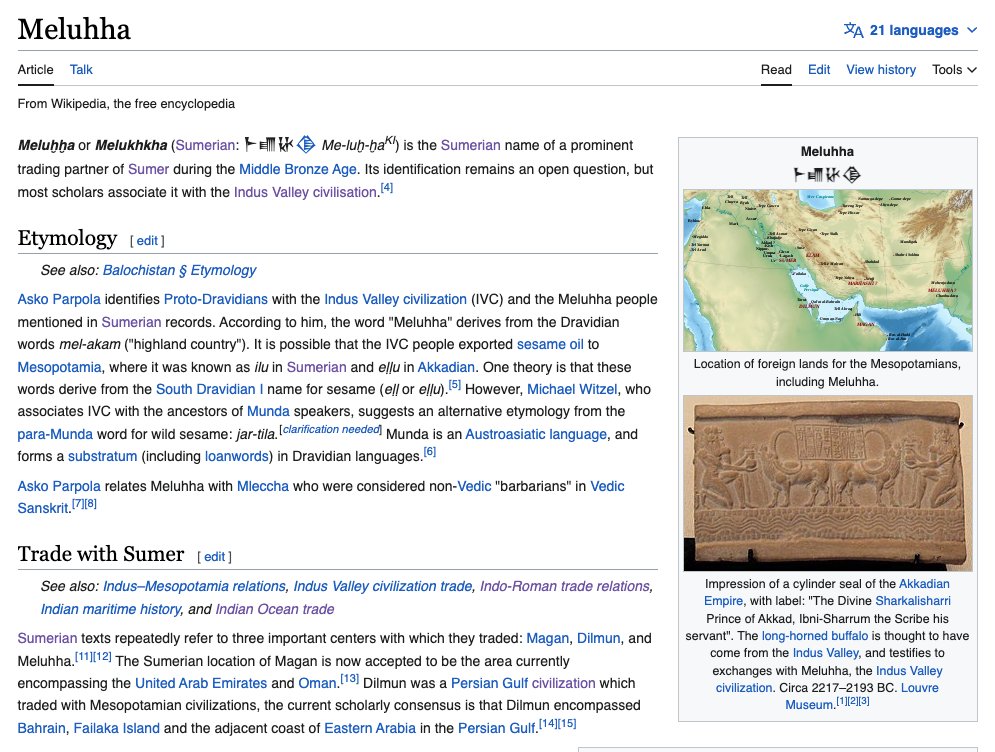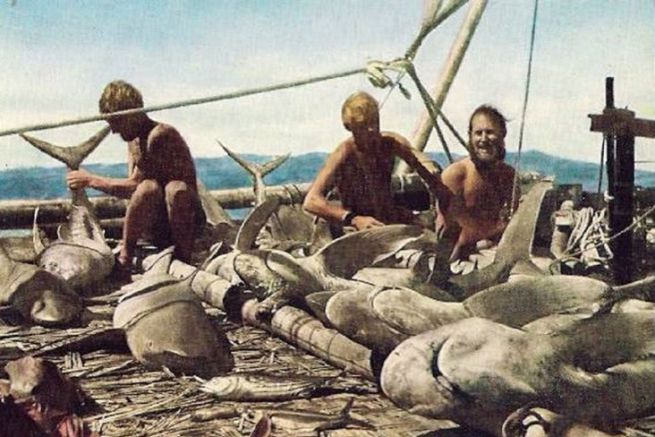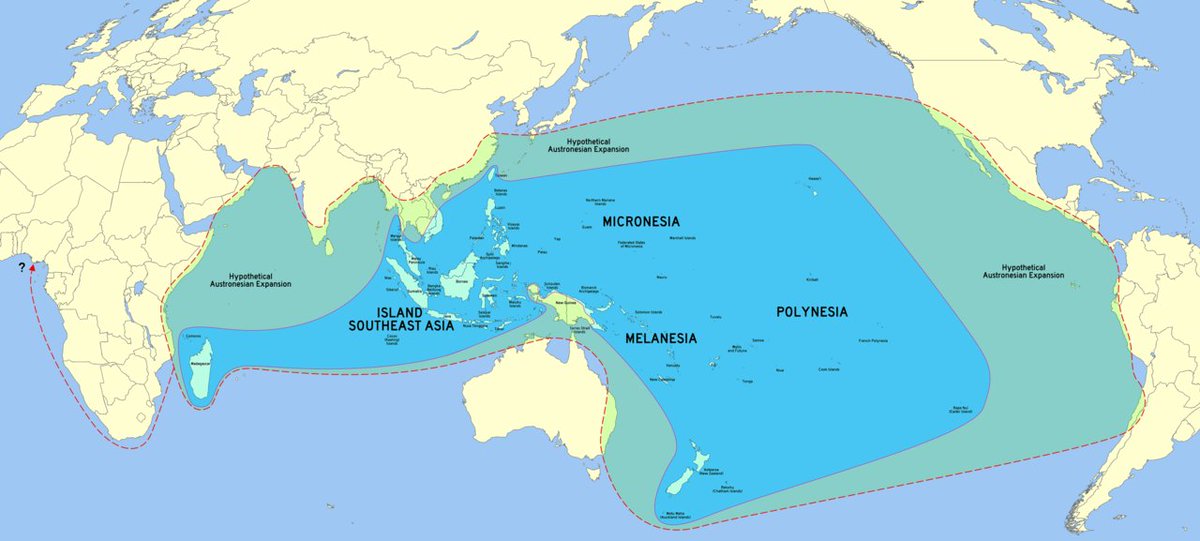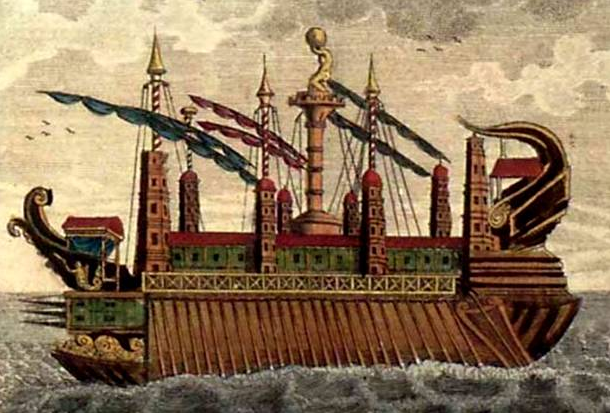Globalization is probably as old as civilization.
Most underrated historical trend not because it rose so high recently, but because it rose from such a high base.
Claims of Ancient Roman jewelry excavated as far away as Japan and Tanzania.
A 🧵 on ancient globalization:



Most underrated historical trend not because it rose so high recently, but because it rose from such a high base.
Claims of Ancient Roman jewelry excavated as far away as Japan and Tanzania.
A 🧵 on ancient globalization:



It is easy to notice a recurring pattern of surprisingly distant trade in historical accounts.
Pliny the Elder and Seneca are both recorded complaining about how much money was being spent on Indian spices and Chinese silk. Roman glassware has been found in China.


Pliny the Elder and Seneca are both recorded complaining about how much money was being spent on Indian spices and Chinese silk. Roman glassware has been found in China.


Roman trade with India was definitely more developed than with China, which seems to have been only indirect.
Alexander the Great invaded India in 327 BC and left behind a Greek kingdom in Afghanistan and central Asia, after all, so India was known to the Mediterranean world.
Alexander the Great invaded India in 327 BC and left behind a Greek kingdom in Afghanistan and central Asia, after all, so India was known to the Mediterranean world.
The "Periplus of the Erythraean Sea" is a 1st century AD Greco-Roman manuscript that describes known trade routes in the Indian Ocean, from the author’s own experience.
It shows the Horn of Africa and India were trade partners, and awareness of China too. But also…
It shows the Horn of Africa and India were trade partners, and awareness of China too. But also…

It describes a route that goes south along the coast of East Africa in “Azania,” terminating in the southernmost trading post of Rhapta, likely in modern-day Tanzania.
Tantalizingly, the author seems to know that, if you keep going, you eventually reach the Atlantic Ocean!
Tantalizingly, the author seems to know that, if you keep going, you eventually reach the Atlantic Ocean!

The Romans apparently also made expeditions to West Africa across the Sahara, reaching Lake Chad from Libya and seeing elephants.
There is also believed to be evidence of at least indirect trade with ancient Greece and Rome in what is today Mali, Niger, and Burkina Faso.


There is also believed to be evidence of at least indirect trade with ancient Greece and Rome in what is today Mali, Niger, and Burkina Faso.


Though central states in Rome and China had limited capacity to direct travel and trade across such distances, we shouldn’t underestimate the capacity of local merchants.
You have to imagine merchants who made careers out of trading between Egypt and India, or India and China.
You have to imagine merchants who made careers out of trading between Egypt and India, or India and China.
Such chained local trade networks would not have made it easy to move people or soldiers, but did make it possible for certain goods to move across continents.
Scholars also believe ancient Sumer traded with the Indus Valley civilization in Pakistan thousands of years earlier.
Scholars also believe ancient Sumer traded with the Indus Valley civilization in Pakistan thousands of years earlier.

The simple boat is believed to be a technology that is up to a million years old, literally older than Homo sapiens.
Thor Heyerdahl proved first-hand in 1947 that a handmade raft can sail you 8000 kilometers across the Pacific Ocean, just like the Polynesians did.


Thor Heyerdahl proved first-hand in 1947 that a handmade raft can sail you 8000 kilometers across the Pacific Ocean, just like the Polynesians did.


Their ancestors, the Austronesians, of course, somehow managed to settle everywhere from Madagascar to Hawaii over a few thousand years.
There is even genetic and botanical evidence of contact between Polynesians and the Americas!


There is even genetic and botanical evidence of contact between Polynesians and the Americas!


The Viking explorer Leif Erikson is now known to have discovered and even settled Canada 500 years before Christopher Columbus.
Apparently trade between the Vikings and North America continued even after the Vinland colony was abandoned. Link: https://t.co/JW2tZLObSSsmithsonianmag.com/history/the-vi…


Apparently trade between the Vikings and North America continued even after the Vinland colony was abandoned. Link: https://t.co/JW2tZLObSSsmithsonianmag.com/history/the-vi…


In 1956, a Norse coin was reportedly found as far south as Maine by some amateur archaeologists.
Skepticism notwithstanding, maybe the simplest explanation is that Vikings really were paying Native Americans in Norse coins, who perhaps traded them further south.



Skepticism notwithstanding, maybe the simplest explanation is that Vikings really were paying Native Americans in Norse coins, who perhaps traded them further south.



Globalization on the order of altering geopolitical priorities of states is new, dating to the discovery of the New World and later.
But globalization on the order of trade, awareness of distant civilizations, and frankly even migration of whole peoples seems very old!
But globalization on the order of trade, awareness of distant civilizations, and frankly even migration of whole peoples seems very old!
Globalization seems to track not distance that can be traveled with a ship, nor size, but the speed that such distance can be traveled.
Speed was the key advantage of the caravel. The Ancient Greeks built a ship so big it could carry 2000 people, but it was “almost immobile.”
Speed was the key advantage of the caravel. The Ancient Greeks built a ship so big it could carry 2000 people, but it was “almost immobile.”

Speed, rather than size or distance, is perhaps what allows a king or company to take an interest in distant lands, since it cuts down timeframes for decision-making and profit.
Otherwise you are relying more on local trade networks for info and way-stops than on ships per se.
Otherwise you are relying more on local trade networks for info and way-stops than on ships per se.
Viking longships were also fast like caravels, but had limited cargo capacity. Ships have only gotten faster and bigger since Columbus.
Today’s cargo ships can carry tens of thousands of tons of cargo and easily travel many times faster than medieval or ancient ships.
Today’s cargo ships can carry tens of thousands of tons of cargo and easily travel many times faster than medieval or ancient ships.
Even with modern technology, 90% of goods are transported by sea. Sea transport is still cheaper than land transport, and an order of magnitude cheaper than air transport.
Globalization depends on boats. And we have had boats for maybe 1 million years. brief.bismarckanalysis.com/p/egypt-tries-…
Globalization depends on boats. And we have had boats for maybe 1 million years. brief.bismarckanalysis.com/p/egypt-tries-…
• • •
Missing some Tweet in this thread? You can try to
force a refresh




